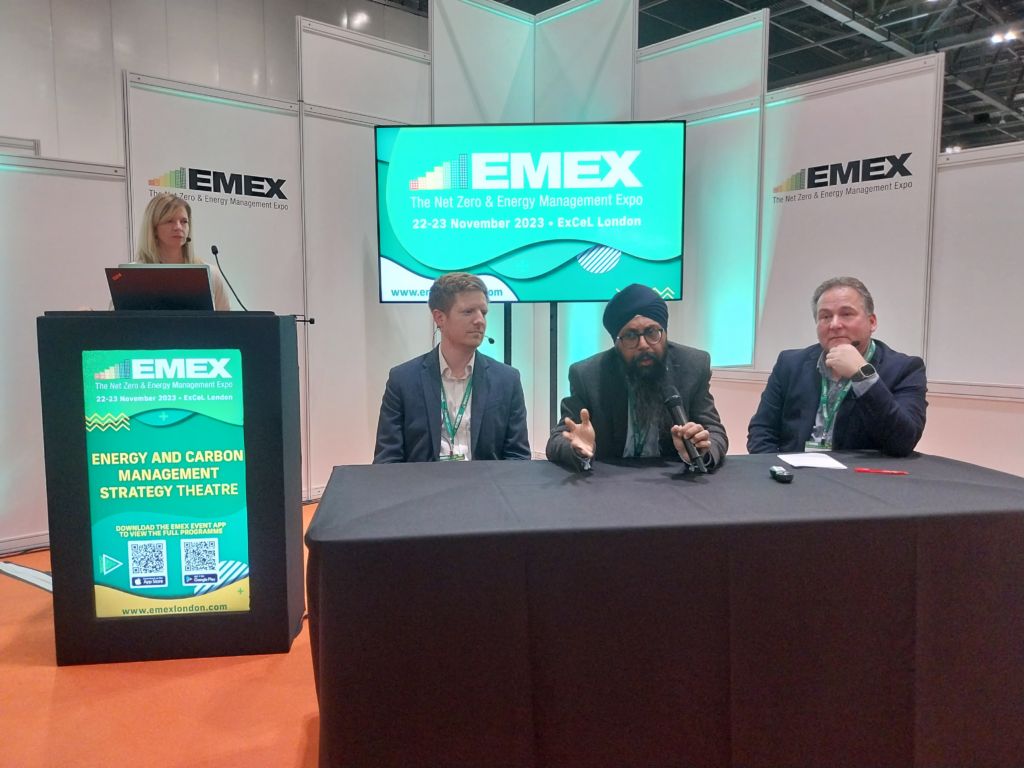The facilities and property management sector has a crucial role to play in the UK’s journey to becoming a net zero society and economy by 2050.
Responsible for the operation of built assets of all shapes and sizes on behalf of organisations working across multiple industries, the practices and actions adopted by FM and CRE companies have a major bearing on sustainability outcomes.
If the country is to get anywhere close to meeting its 2050 target, our building stock must be decarbonised as a matter of urgency. This is where expert panellists at events like EMEX help us. Yes, new buildings that come into play between now and 2050 will doubtlessly be more energy efficient, but the fact remains that 80% of 2050’s building stock is already standing.
This means the ways in which buildings are managed and used is critical to any decarbonisation efforts. From lighting, heating, and water systems to waste management and behavioural habits of occupants, there is an enormous array of metrics that feed into how sustainable or green a building is.
EMEX: looking at the future
Last week I had the pleasure of moderating two panels at EMEX, the Net Zero and Energy Management Expo in London. The first was about how businesses can reduce their energy costs. Kam Singh from EMCOR UK, Jason Koffler from Critical Power Supplies, and Eric Bakken from JLL were the three expert panellists.
We covered a huge amount in just 30 minutes. The key takeaways were: treat energy management and procurement as a risk project; be insight- and output-driven with data (don’t just collect it for the sake of it); understand your energy profile and ensure systems are only running when they need to be and that buildings are well insulated and energy efficient; and invest in and implement alternative power supplies to not only safeguard the provision of critical power when and if blackouts strike, but to also reduce energy usage and therefore cost and carbon footprint.
The second panel I moderated was about greenwashing. Greenwashing mainly involves overpromising or misleading people as to the beneficial environmental impact of products, services, partnerships and other ESG activities. It is not always done maliciously, or even intentionally. However, ‘talking the talk’ rather than ‘walking the walk’ can be just as damaging as saying nothing.
I was joined by Rachel Houghton of BMG, Mitakshi Sirsi of Broadway Malyan and Will + Partners, and Charlie Martin of The Anti-Greenwash Charter. In summary, when it comes to communication concerning environmental sustainability there needs to be a commitment to the principles of transparency, accountability, fairness, and honesty. This applies to conversations with clients, prospects, employees or the wider market and general public.
Yes, this should go without saying, but given the amount of greenwashing in the sector, more needs to be done. That’s what’s driving the Anti Greenwash Charter, a campaign promoting responsible marketing practice across the built environment industry.

Jo Sutherland presenting the energy reduction panel with Eric Bakken, Kam Singh, and Jason Koffler (left to right).
What is real sustainable progress?
The built environment sector has a huge role to play, starting now. Indeed, the industry is well aware of its ESG obligations, with discussions around sustainable strategies picking up speed. Unfortunately, among all the noise there are a lot of buzzwords, cliches and spurious claims being made.
It is all too easy to talk about the likes of net zero, carbon neutrality, recyclable products, supporting the circular economy, and zero-waste solutions – but what do all these things mean in practice, and how can any claims around them be substantiated?
A good place to start is to set clear parameters and definitions around what various terms relating to ESG and sustainability progress actually mean. Common terms include closed loop, organic, reclaimed, zero-waste, carbon neutral, fair trade, natural resources and many more in between.
Where possible, ‘progress’ should be underpinned by data. The FM and CRE world is rapidly adopting smart technologies to better manage building operations, the likes of CAFM and BIM now commonplace in many setups. These are the ideal tools from which real sustainable progress can be measured and proven. Key sustainable performance metrics such as energy consumption, water usage and indoor air quality can all be logged and viewed in these systems, with sensors able to automatically gather and input the data.
Any strategy designed to boost performance in any of these areas can thus be evaluated fairly and accurately, with FM teams safe in the knowledge that their claims can be backed up with evidence.
Avoiding the greenwashing trap
How the sector communicates its sustainable initiatives and progress is equally important.
All too often we see brands fall into the trap of adopting behaviour or activities that make people believe that they are doing more to protect the environment than they really are. This is not only unethical practice – it can also lead to serious consequences in terms of brand image, reputation and customer loyalty.
Miscommunicating ESG credentials is easily done. Indeed, it often occurs unintentionally due to a lack of diligence or understanding of the claim and the substance behind it.
This is why we are signatories to The Anti-Greenwash Charter. Adherence ensures green claims made about our products services are fair and substantiated, and this applies to all communications made and distributed on behalf of our clients, from news releases and internal comms to creative designs and digital marketing.
Our clients, through their own commitments to sustainability and integrity, play a pivotal role in our ongoing battle against greenwashing.
As a communications partner, we commit to serve as an editorial panel on their behalf, championing the standards set up in The Anti-Greenwash Charter throughout the lifecycle of every PR and marketing campaign. We also pledge to answering any email queries about our clients’ green credentials within a working week, such is the confidence we have in them and the way we communicate ESG content.
To do this effectively, we also have to challenge our clients to be upfront and transparent when making claims. If we cannot properly substantiate green credentials or messaging, we will not proceed with publishing or circulating content until validation has been made.
Contribute to the conversation
To push this debate forward, we are looking for contributors for the second Good Business series which starts in January 2024. To register interest in taking part, please email our MD with the key change you would like to see in the industry and why: jo.sutherland@magentaassociates.co
Do you want to discover more about how we can help to clearly communicate your organisation’s sustainability progress? Contact us today.









